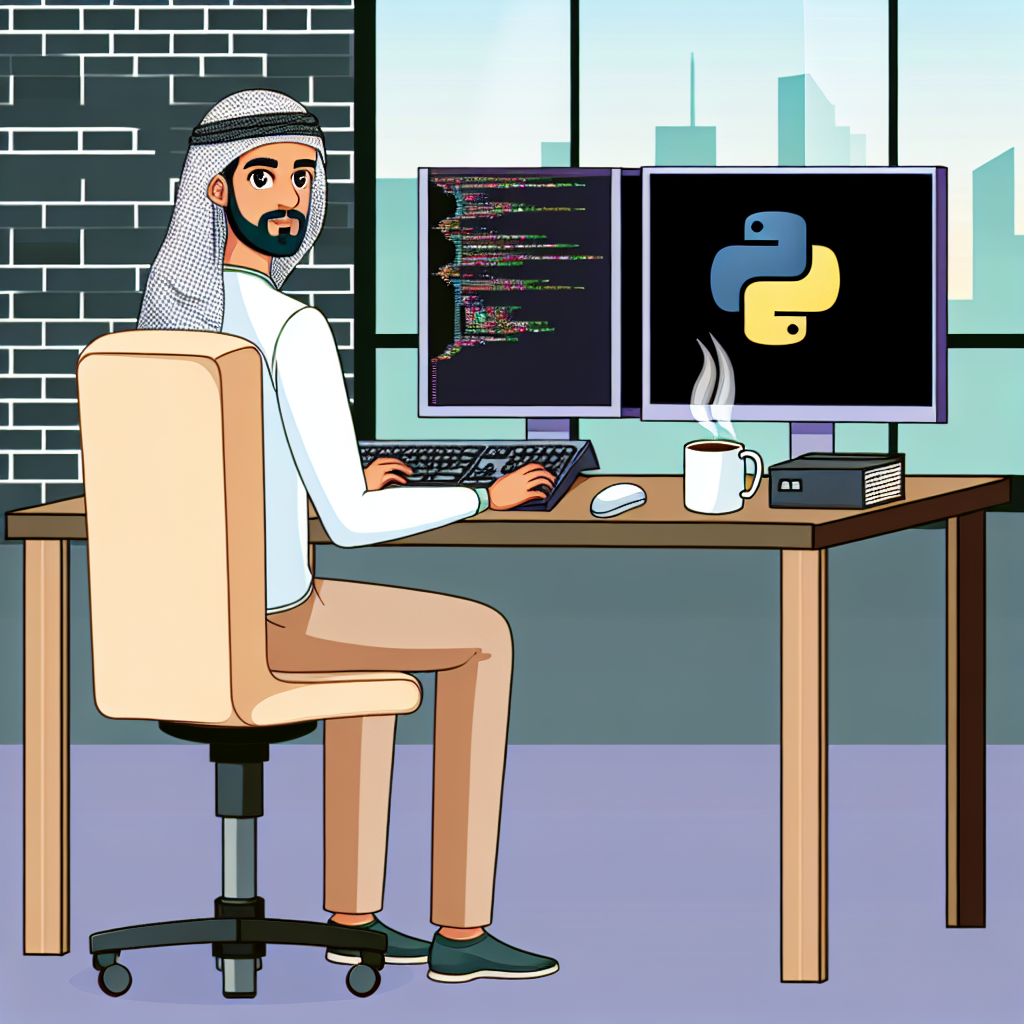“I want people to remember me as someone whose life has been helpful to humanity.”
Thomas Sankara.
Thomas Sankara is a popular name – not only to Burkinabés but political enthusiasts in Africa and around the globe. Also known as “Africa’s Che Guevara,” Thomas Sankara led Burkina Faso’s ambitious agitation for democratic, social, and economic change between 1983 and 1987.
He was born Thomas Isidore Noël Sankara on December 21, 1949, in Yako, northern Upper Volta (now Burkina Faso). Sankara was only 12 when his country gained independence from France.
The man is by no means a saint (no one is). After all, he gained power through the 1983 military coup, notoriously banned free press and trade unions, and also executed his enemies. But he led Burkina Faso in a way no one had ever done before him. Or, quite possibly, none has even after him.
Thomas Sankara Facts
Whatever the case, Thomas Sankara will be on the right side of African history. Here, we detail interesting facts about Thomas Sankara, a proponent of Pan-Africanism.
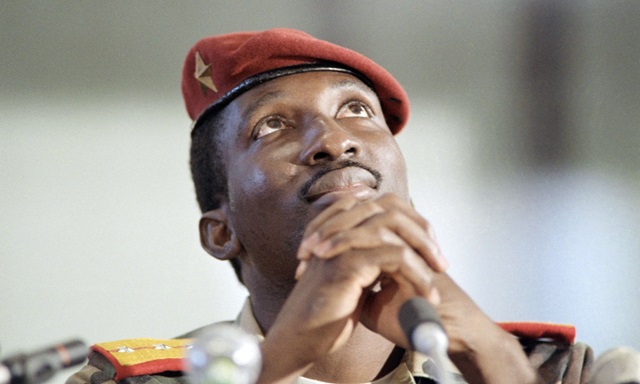
Thomas Sankara’s Parents Wanted Him to be a Priest
Thomas Sankara was born to Roman Catholic parents, a Peul father, and a Mossi mother, who wanted him to be a priest. While they tried their possible best to ensure this happened, Sankara’s heart was set elsewhere – the military.
He eventually got his wish in 1970 when he was sent to Antsirabe, Madagascar, for officer training at age 20. Although he was always fearless, something happened to Sankara in Madagascar, which fortified his formidable spirit to challenge the status quo. He witnessed an uprising of workers and students that succeeded in overthrowing Madagascar’s government.
Sankara returned to Upper Volta in 1972 with a new spirit. Before that, he attended a parachute academy in France, where he learned left-wing political ideologies. He garnered considerable public prominence in 1974 for his heroic efforts during the border conflict with Mali, but years later, he denounced the conflict as useless and unjust.
His Closest Ally, Blaise Compaoré, Organized a Coup d’état That Brought Him to Power
Captain Thomas Sankara became president on August 4, 1983, at age 33, as a result of a coup d’état called the “August Revolution,” planned by Blaise Compaoré, his close friend. Libya, which was at the moment on the edge of war with France in Chad, supported the coup d’état.
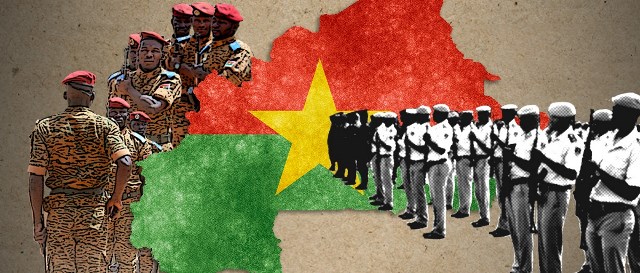
The new government was called the National Council for the Revolution (CNR). As president, Sankara worked to eradicate corruption, advance reforestation, prevent hunger, uphold women’s rights, improve rural areas, and prioritize healthcare and education. However, he faced criticism for alleged human rights abuses, especially against whoever opposed his government.
Thomas Sankara Renamed His Country
One year after the coup, Sankara changed his country’s name from the French colonial one, Upper Volta, to Burkina Faso, meaning “the Land of the Upright People in Moré and Dyula, which are two dominant languages in the country. Some translations have it as “the Land of the Honest People.”
He Was a Frugal Leader
As soon as he came into office, Thomas Sankara sold off the government’s Mercedes fleet and replaced them with the regular Renault 5, which was at the time the cheapest car in Burkina Faso. All government officials and ministers were required to use Renault as their official service vehicle.
Sankara also slashed the pay of every public employee, including himself, and prohibited the use of government chauffeurs and first-class airfare. Additionally, he mandated all public employees donate one month’s income to a public project.
Notably, he reduced his monthly income to $450 while serving as president and kept just a car, three guitars, four bikes, a refrigerator, and a malfunctioning freezer. He refused the air conditioning in his office, saying that only a small number of Burkinabes could afford such a luxury.
Most countries have the president’s portraits in offices and public places, but Thomas Sankara declined such honor. His reason was that there were many other Sankara’s out there who wanted their pictures on walls but still didn’t hang them.
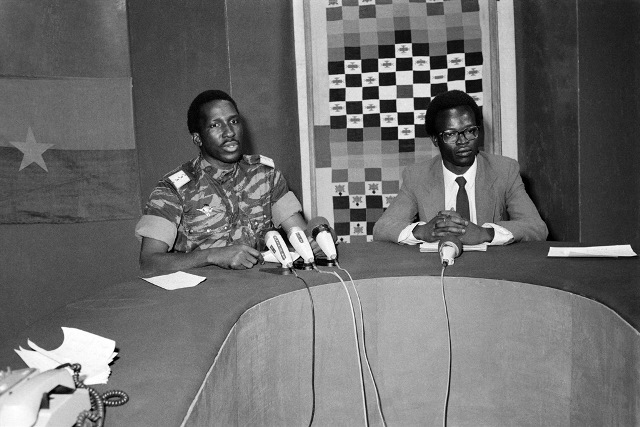
Thomas Sankara Supported Gender Equality and Women’s Rights
Sankara was ahead of his time, especially with his commitment to achieving gender equality. He established special literacy programs for women and provided maternity education in rural areas. He appointed women and gave them positions in his power, as well as drafted them into the military.
The former Head of State ordered pregnant girls to continue attending school. He made forced marriages and female genital mutilation illegal. Widows were allowed to inherit their marital estate, and polygamy was banned.
While speaking on International Women’s Day on March 8, 1987, Thomas Sankara said:
“The revolution cannot triumph without the emancipation of women.”
Thomas Sankara
To ensure that women’s rights were upheld, Sankara implemented huge fines and penalties for women’s oppression. He also established an all-female motorbike personal guard because he was a motorcycle rider. He took the women everywhere he went around the nation.
Sankara Addressed Climate Change
Thomas Sankara launched the “People’s Harvest of Forest Nurseries” initiative in 1985. The program provided nursery stock to 7000 villages. Sankara addressed Burkina Faso’s widespread desertification as a means of combating difficulties with climate change.
“Colonialism has pillaged our forests without the least thought of replenishing them for our tomorrows.’ – Thomas Sankara.
Sankara also planted more than 10 million trees to stop the Sahel’s increasing desertification. The Great Green Wall project, which aims to create an 8,000 km-long global natural wonder across the entirety of Africa, is just now being planned by African states.
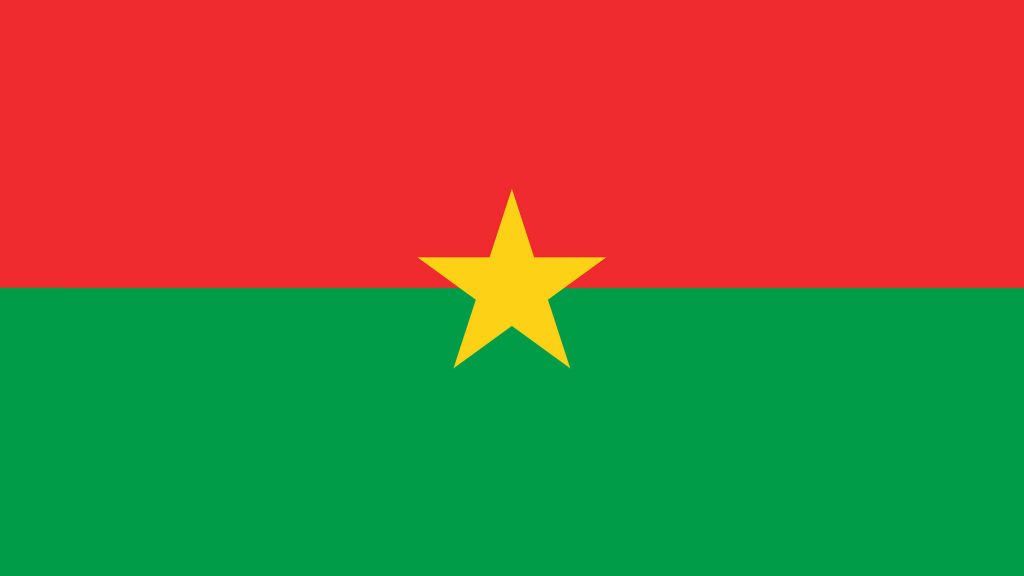
He Composed Burkina Faso’s National Anthem and Designed the Flag
Thomas Sankara is quite possibly the only leader worldwide to write their country’s national anthem. The accomplished guitarist composed the anthem, Une Seule Nuit (One Night Only), including the tune. He also designed Burkina Faso’s flag.
He Led the Redistribution of Land
Feudal landlords held lands before Thomas Sankara became president. But that changed. Sankara redistributed land by giving it back to the working classes. The result of this was incredible. Wheat production increased from 1700 kilograms per hectare to 3800 kilograms per hectare in just three years. During this time, Burkina Faso improved its level of food security through self-sufficient farming.
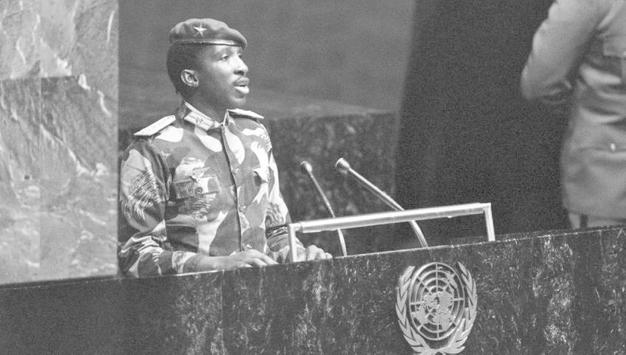
Thomas Sankara Wasn’t a Fan of Foreign Aid
His famous words ring true today:
“The one who feeds you usually imposes his will upon you.”
Thomas Sankara said in July 1987 at the Organization of African Unity summit.
Sankara wanted Burkina Faso to sustain itself without foreign assistance. He turned down financial aid from the International Monetary Fund (IMF). Sankara was an ardent champion of African unity. He advised other African governments to stop accepting aid from abroad, claiming it was a kind of neo-colonization.
Captain Thomas Sankara also tried to convince other African nations to forgo paying their previous colonizers’ debts. He claimed that because the debt dates back to colonialism, Africa is not obligated to repay it.
He Supported Vaccinations
Sankara began his leadership by implementing a widespread immunization program. More than two million Burkinabe received vaccinations against polio, measles, yellow fever, and meningitis between 1983 and 1985, including one million children.
As impressive as that is, what’s more, exceptional is that it was completed in only three weeks! According to data from the United Nations Children’s Fund (UNICEF), these diseases claimed the lives of between 18000 and 50000 children in 1980. Sankara’s proactive program saved lives.
Sankara Actively Campaigned Against Apartheid
Like Nigeria and many other African governments, Sankara vehemently opposed the apartheid system in South Africa. He openly criticized Francois Mitterrand, the president of France, for welcoming an apartheid leader to his country.
Betrayed and Killed by His Close Ally
If you’re familiar with the story of Julio Caesar, then the phrase “et tu, Brute?” isn’t new to you. Sankara met a similar fate to Caesar because he was betrayed by his close friend, Blaise Compaoré.
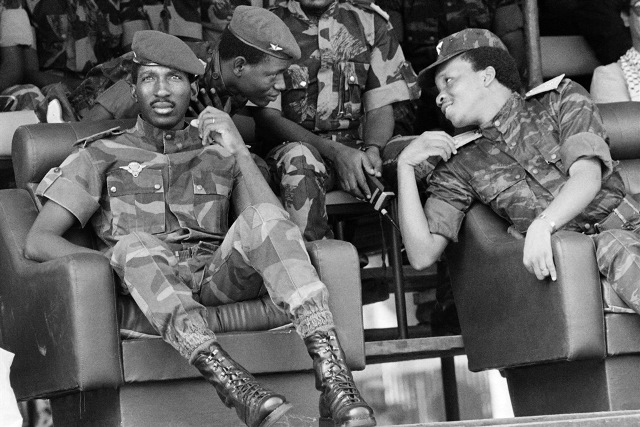
Fourteen men were trialed for Sankara’s murder, including Blaise Compaoré, who led the coup that brought Sankara to power.
Compaoré also led the coup that eventually killed Sankara in 1987. He became president after Sankara’s assassination and ruled for nearly thirty years. After being ousted in 2014, he fled to Ivory Coast. In 2021, he was charged in absentia for his role in Sankara’s murder. Compaoré snubbed the trial and denied involvement in the death of his close friend. His regime was accused of preventing the trial from taking place, so his ousting left room for justice to take place.
Mariam Sankara, the widow of Sankara, claimed that the trial would provide her with much-needed closure. She claimed that other people who died on that day also deserve an explanation for what happened.
Compaoré was found guilty of his role in Thomas Sankara’s murder and sentenced to life imprisonment in absentia.
We Design & Develop Websites, Android & iOS Apps
Looking to transform your digital presence? We specialize in creating stunning websites and powerful mobile apps for Android and iOS. Let us bring your vision to life with innovative, tailored solutions!
Get Started TodayHowever, Compaoré may never serve the sentence. Since being ousted from power in 2014, he has lived in exile in Ivory Coast and gained Ivorian citizenship.
How Was Thomas Sankara Killed?
Captain Thomas Sankara, 37, and 12 other people were shot dead on October 15, 1987, as part of the coup d’état that installed Compaoré in power. He was lured to his death for a presumed National Revolutionary Council meeting. Sankara and Compaoré seized power together just four years before. Sankara’s anti-imperialist ideology and austere lifestyle have made him a hero to many people in Africa.
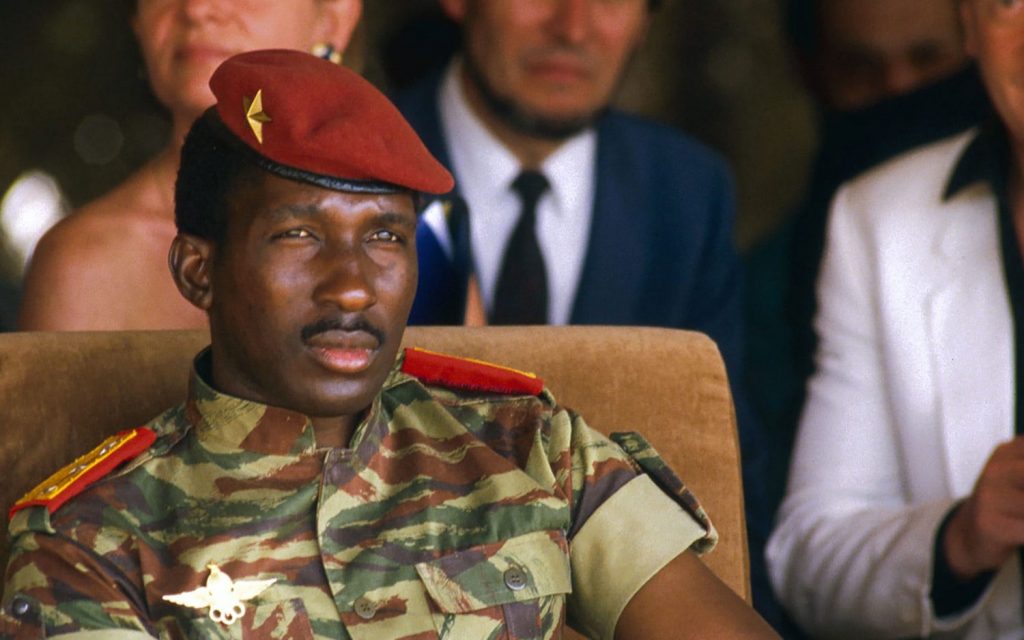
Thomas Sankara Was Shot Multiple Times
According to ballistics professionals who also testified during the trial, Sankara was shot at least seven times in the chest.
Ten Others Were Found Guilty
Ten additional people were also found guilty, including Haycinthe Kafando, Compaoré’s head of security, who was charged with organizing the hit squad.
He had been hiding out for a while, and his case was also tried without him present. Likewise, he was given a life sentence.
Gilbert Diendéré, an army commander during the 1987 coup, was present during the trial. He was also sentenced to life imprisonment and is already serving a 20-year sentence for one coup attempt in 2015.
His lawyer said the sentence was “excessive” because he should have received consideration for being at the trials, unlike others who weren’t. Three defendants were found not guilty, and eight other defendants were given terms ranging from three to twenty years.
Thomas Sankara only ruled for four years, but his impact was riveting, and he set the standard for what people-focused leadership should look like. Many African leaders can take a leaf out of his book.
In 2019, a 16-feet (6m) statue of Thomas Sankara was erected in Ouagadougou, the Burkina Faso Capital.
Before You Go…
Hey there! You got to the end of Thomas Sankara’s impressive life. I hope this was insightful. But one last thing before you go. Our team at Nicholas Idoko Technologies can help you build custom software development.
We can develop web, mobile, desktop, and blockchain applications tailored to your budget and vision. We are also interested in your growth and will continue to track your progress as you scale your product. Our work cuts across several industries, including eCommerce, online games, voting and payments, blockchain, and many more.
We’re readily available for consultation. Contact us now.
Put Your Tech Company on the Map!
Get featured on Nicholas Idoko’s Blog for just $200. Showcase your business, boost credibility, and reach a growing audience eager for tech solutions.
Publish Now








